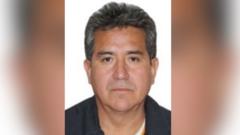The extradition, which has sparked political backlash, raises significant questions about Bolivia’s relationship with the US and its approach to drug trafficking.
Bolivia's Controversial Extradition of Former Anti-Drug Chief to US

Bolivia's Controversial Extradition of Former Anti-Drug Chief to US
Bolivia has extradited its former anti-narcotics director Maxmiliano Dávila to face drug trafficking charges in the US.
Bolivia's former anti-drugs chief has been extradited to the United States, where he is set to face serious drug trafficking allegations. Maxmiliano Dávila, infamously known as "Macho", had previously served as the head of Bolivia’s anti-narcotics agency but is accused of facilitating cocaine smuggling operations during his tenure. His extradition occurred on Thursday following the approval from Bolivia's Supreme Court last November.
Dávila stands charged with drug trafficking and weapons offenses, claims he adamantly denies. He had been imprisoned in Bolivia since February 2022, facing corruption charges when U.S. authorities uncovered a federal indictment against him. The U.S. Department of State alleges that during his directorship of the Bolivian Special Forces for the Fight Against Drug Trafficking (FELCN), Dávila took advantage of his position to facilitate the transportation of cocaine to various countries, ultimately destined for the United States.
Faced with potential convictions that could lead to a minimum of ten years and potentially a life sentence, Dávila is under scrutiny as the U.S. had previously offered a reward of up to $5 million for information on his trafficking activities. Notably, Dávila was appointed by the former President Evo Morales, who led the country from 2006 to 2019.
In light of the extradition, Morales expressed strong opposition, criticizing the decision and claiming that Bolivia has once again become a "US Colony." He further contended that the extradition violates international agreements by extraditing Bolivians without due process in their homeland. Morales is under investigation for separate criminal allegations, including statutory rape and human trafficking—irregularities he vehemently denies, claiming political persecution from the current regime.
Following the news, Morales' supporters organized protests across the nation, demanding an end to the investigation into his alleged crimes. Additionally, Morales recently documented an incident involving gunfire directed at his vehicle, which he interpreted as an attempted assassination, a claim the Bolivian government rejected. The unfolding events highlight a turbulent intersection of politics, drug enforcement, and international relations in Bolivia.



















